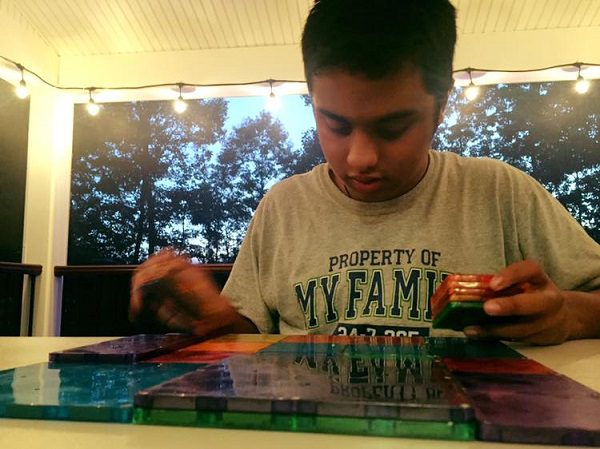
When you have a child with autism or any sort of disability, you have to consider forms of guardianship and conservatorship as they approach their 18th birthday. Old news to those of us living with or supporting and loving an autistic child or loved one.
Many of my friends, whose children and D have traveled this path together for years, are approaching this big moment or are past it. Others are years away from it.
And so, you do your research or sit in the lawyer’s office and discuss this all. And words like incapacitated, incapable or incompetent, rights and control are casually mentioned (without ill-will or carelessness – it’s just part of the legal process) across the table to you.
And you think of the beautiful baby you birthed 17 years ago. And those are not the words you think of when you picture his face. These words do not do him justice. This is not how you would describe him.
I wrote these words after coming back home from a meeting with our lawyer to get the ball rolling on D’s guardianship. And, as per my usual, I cried. Ruminating on things can be detrimental to your health. I’ve learned this about myself, especially in the past few years, especially in the past few months as I check boxes off my to-do list for what needs to be done for D before or as he turns 18.
I wonder, why do I think about these things so much? None of this is a surprise. I’ve been preparing for this for years. I attended my first set of training sessions on how to prepare for transitioning your autistic child into adulthood when D was 13 years old. Back then, I’m sure my husband wondered why I wanted to think about these things so soon.
I knew, however, that it couldn’t be soon enough. Better get to know these things early enough, and then revisit and learn them again closer to the appropriate time.
So, I attended the three-part seminar, put on by my local Autism Society, a few months before D was turning 17. Came home with a binder full of information and a plan on how to get this all done.
Turns out, having a plan and executing that plan are two entirely different things.
There is a tremendous amount of weight in words like “incapacitated and incompetent.” Literally, it means a person does not have the mental acuity to do for themselves, that they are unable to manage their own affairs or make any sort of decision – from financial to health to educational, emotional or daily living – for themselves. That someone else will be managing their affairs, making decisions on their behalf.
How do you put that into binding legalese? Even if it needs to be done, it feels like a betrayal of your child.
**********
The ride home with D was surprisingly peaceful and quiet, a welcome change of affairs from how last week ended. On Friday when I picked him up, I was on edge and worried, having received a call from his teacher detailing a bad bout of self-injury and aggression that had occurred. D had done things that his teachers had never seen, being that he has been in their classroom for only five months.
But they were also things I hadn’t seen in a few years myself, and so I was worried – worried that we were headed back down a path none of us wanted to ever be on again.
But, the weekend passed by quietly enough. Though we asked multiple times if he wanted to go to the park or out anywhere, D refused and kept to himself. It was what he needed – time at home and to be left alone.
I sent him to school Monday morning with prayers on my lips and hovering in my heart. Dear God, give him a good day. Let it be full of peace and learning.
He entered my car later that afternoon at ease and surprisingly quiet, which continued into the afternoon. Later that evening though, post-dinner when the bewitching hour begins, his old nemesis returned in a tsunami of night-time anger, anxiety and meltdowns. At times like these, there is little to be done other than making sure he is safe in his environment – and even that can be a crap shoot.
My husband was downstairs quizzing our youngest for an upcoming test, and our daughter had disappeared somewhere. I could hear the screams and yells coming out of D’s room, the lights shaking over our dining table as he jumped and pounded the ground. What is there to gain by putting myself in that room with him? Not much. What is there to lose by sitting downstairs in anguish while he yells in anguish up above me?
Everything.
So, I went into his room and sat in the corner while he raged near his bed, screams and shrieks echoing off the walls. His breathing was shallow between screams, his eyes glazed over in anger. At one point I held his hands, foolishly helping it would get him to stop.
He gripped my hands and dug his nails in, shaking my hands and arms up and down. It was his nonverbal way of telling me that he was unable to stop, that this anger had to run its course until he was spent and quiet. I knew that. Of course, I knew that. And yet I can’t help myself, and so sometimes I try and intervene, like the strength of my sheer will will compel him to calm down.
It doesn’t.
More than anything, I want him to know that I am there, that I am bearing witness to his pain, to him. That it doesn’t matter what he does or doesn’t do – I will be there. I will not be pushed away further then he needs me to go.
Soon enough the anger and anxiety passes, and he is spent by the expulsion of his uncontrollable energy. I ask him if he wants water, and he indicates yes. I go downstairs and get a glass of water and his square Magna Tiles, which are stacked into a tower formation that he made as he ate dinner. I take the tiles and water up to him and ask if he’s ready for me to read.
He is silent. I take that for a yes.
I settle in on the chaise in his room and open the book to where we had stopped last – D! We finally have gotten to the Quidditch chapter, I tell him. We are reading the first Harry Potter book, as he indicated us awhile back that he wanted us to read the series to him, as both his brother and sister have read it as well. We have been talking about Harry Potter for years, with it reaching a fever pitch this past summer as H went on a reading frenzy to finish the series.
It never occurred to me that D was feeling left out in all the Harry Potter craze, until he indicated to us that he, too, wanted to have the books read to him.
I read aloud to him as he pushes all the pillows on his bed into the corner and lays down on them. Daughter A enters the room, bearing me a mug of strong chai that I had left simmering on the stove and had forgotten. How nice it is to be at this place in time, when my 14-year-old brings me my post-dinner chai without me having to ask for it.
We get through the Quidditch chapter, and as soon as I finish the last page, D heads downstairs for a change of scenery. I shut the book, tidy up the tiles and toys that were thrown around during his rage episode, and return downstairs to wrap up my evening chores.
**********
There is intelligence and understanding in him. There are opinions and choices and thoughts and the capacity to learn and absorb – just not in the way most of us are used to. There is love and genuine affection for those he loves. There is trust, unbearable trust, that we will do right by him.
There is shared joy in the moments of pure and honest living, when we are sitting at the dining table and D leans his shoulder into A, asking her in a language that needs no words, to punch his arm for sensory input.
She punches. I protest. But he wants me to, she says to me. Indeed, he does. And all the kids laugh while their father and I roll our eyes and suppress our laughter until we cannot any longer. He lays his left hand flat on the table, jutting his elbow out at a ninety-degree angle. A does the same with her right hand and elbow, juxtaposing it next to his.
They laugh some more.
You are so lucky, their dad tells A and H, to have an older brother like Bhai who is so easy on you and loves you guys so much.
Easy may not be what I’d call it, but I understand what he means. In so many ways, D is easy-going. His filters are relatively absent, and his emotions are right there for us to absorb. We stumble to understand the meaning and reasons behind the emotions and behaviors, but he is patient with us, giving us infinite chances to start over again and again and again with him.
We will pursue guardianship of D come his 18th birthday, and we will hear a judge use the words incapacitated and incompetent as we stand before him – as D stands before him. Before that court hearing and after, I will apologize to my son, telling him that in no way shape or form is he incompetent, and that I will try my best to make decisions with him and not for him.
You are smarter than any of us will ever know, I will tell him, and I’m grateful to be your mother.















